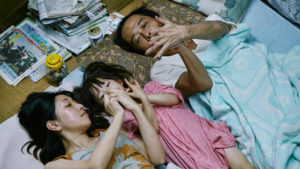Palme d’Or winner SHOPLIFTERS is a radical deconstruction of family values in a world of dubious ethics. Set amid the throwaways of society, in this case Japan, it finds warmth and togetherness where we would least expect it, and from a family that is not so much scamming the system as they are a family that have been scammed into what they have become, yet remain generous and compassionate.
Said family of four is close-knit not only because of their ties of affection, but also because of the cramped living quarters in their tiny, cluttered garden apartment. There, laundry-worker mom (Sakura Andô) and construction-worker dad (Lily Franky) raise their son, Shota (Jyo Kairi) with a financial assist from the shoplifting father and son do to supplement their meager income. There’s an emotional assists from Sister Aki (Mayu Matsuoka), who works at a peep show masquerading as a schoolgirl playing hooky, and the pension that grandma (Kirin Kiki) receives. One cold winter’s night after a bout of father-son shoplifting, Dad spies a little girl (Miyu Sasaki) peering at him through a half-open window. She’s skinny, and all alone despite the lateness of the hour. When he offers her one of the croquettes he’s just purchased legitimately, her hunger prompts him to take her home, where her shyness and scars raise suspicions. When he and his wife take her back to her home, the shouting of her biological parents, invectives and recriminations about not having wanted the girl in the first place, prompts them to keep her and rename her Lin. It’s not kidnapping, mom opines. She’s not being kept against her will, and no one is demanding a ransom. From there, sibling rivalry, grandmotherly wisdom, and the genuine pleasure of family life, even with all the bumps along the way, present a portrait of an almost Platonic ideal of family life, despite the carefully choreographed shoplifting exercises. And it would have all gone smoothly if only Lin’s less than perfect shoplifting skills hadn’t gotten her caught, prompting the store owner to do something that changes Shota’s perspective, thereby shaking him to his core.

Sakura Andô, Miyu Sasaki. Lily Franky
Filmmaker Hirokazu Koreeda balances the tender, but unselfconscious moments of family life, with the more and more justifiable petty crimes committed, and the blows, literal and figurative that society inflicts on this unconventional family. By the time Dad is asked why he teaches his kids to steal, it’s with a mixture of pride and regret that he replies that he has nothing else he can teach them. When Mom and a co-worker are forced to decide between themselves who will lose their job, it’s an injustice that transcends a mere legal system. And when Dad and Shota have a man-to-almost man talk, there is no question that Shota has the best father in the world, just as Lin has found the best mother, as she explains the real meaning of love to the little girl on a warm summer night as they listen to fireworks in the distance. The performances are unfussy, while the camera work is both adept and unobtrusive, allowing for an immersive experience that gives the film an immediacy in its simulacrum of reality.
SHOPLIFTERS is a quiet film of heartbreak, humor, and joy that finds profound truths in small moments of enormous impact. The virtues of those who are legally criminals contrasted with the obtuseness of those enforcing the status quo poses a conundrum for the viewer, as well as a bit of cinematic poetry.
Your Thoughts?